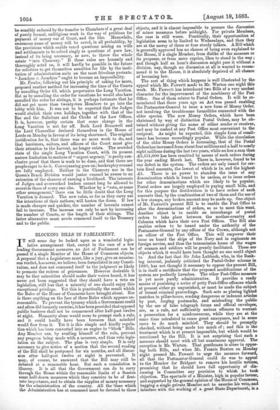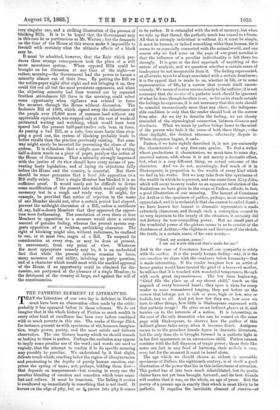BLOCKING BILLS IN PARLIAMENT.
IT will some day be looked upon as a wonderful legis- lative arrangement that, except in the case of a few leading Government measures, no Act of Parliament can be passed if a single Member of the House of Commons objects. A proposal that a Legislature must, like a jury, give an unanim- ous verdict, has never, we believe, been formulated in any Consti- tution, and does not commend itself to the judgment as likely to promote the redress of grievances. However desirable it may be that minorities should make their voices heard, it has never yet been suggested that they should have a veto on legislation, still less that a minority of one should enjoy this exceptional privilege. Yet this is practically the result which the Rules of the House of Commons have brought about. Nor is there anything on the face of these Rules which appears un- reasonable. To prevent the tyranny which a Government could and often did formerly exercise, it has been provided that opposed public business shall not be commenced after half-past twelve at night. Humanity alone would seem to prompt such a rule, and it could hardly have been foreseen that mischief would flow from it. Yet it is this simple and kindly regula- tion which has been converted into an engine to "block" Bills. Any Member can, by availing himself of the rule, prevent any progress being made with a measure, and thus veto legis- lation on the subject. The plan is very simple. It is only necessary to give notice of a motion that the second reading of the Bill shall be postponed for 'six months, and all discus- sion after half-past twelve at night is prevented. It may, of course, be answered that the Bill may still be debated at a reasonable hour. But such a consolation is illusory. It is all that the Government can do to carry through the House within the reasonable limits of a Session some half-dozen measures which they conceive to be of first- rate importance, and to obtain the supplies of money necessary for the administration of the country. All the time which the Administration has at command must be devoted to these
objects, and it is almost impossible to procure the discussion of minor measures before midnight. For private Members, the case is still worse. Practically, their opportunities of legislation seem to be limited to Wednesdays, and then they are at the mercy of three or four sturdy talkers. A Bill which is generally approved has no chance of being even explained to the House, if a single Member, from dislike of the measure or its proposer, or from mere caprice, likes to stand in the way ; and though half an hour's discussion might pass it without a division, nay, though no discussion at all is wanted to recom- mend it to the House, it is absolutely deprived of all chance of becoming law.
The sort of thing which happens is well illustrated by the appeal which Mr. Fawcett made to Mr. Warton one night this week. Mr. Fawcett has introduced two Bills of a very modest character for the improvement of the machinery of the Post Office. One of them relates to Postal Orders. It will be re- membered that three years ago an Act was passed enabling the Postmaster-General to issue a new form of Money Order, not involving the troublesome formalities connected with the older species. The new Money Orders, which have been christened by way of distinction Postal Orders, may be ob- tained without giving the name of either sender or receiver, and may be cashed at any Post Office most convenient to the recipient. As might be expected, this simple form of remit- tance has become exceedingly popular. While the circulation of the older Money Orders is decreasing, that of the Postal Orders has increased from about four millions and a half to nearly eight millions during the last two years, while no less a sum than £3,451,000 has been remitted by means of each orders during the year ending March last. There is, however, found to be one defect in the system. - The orders are only issued for cer- tain fixed amounts, the lowest of which is ls. and the highest £1. There is no power to abandon the issue of any denomination which is found to be useless, or to issue orders for other denominations which are likely to be popular. Postal orders are largely employed in paying small bills, and for this purpose the desideratum is to have orders of such amounts that, by the combination of two of them and the use of a few stamps, any broken amount may be made up. One object of Mr. Fawcett's present Bill is to enable the Post Office to alter the denominations of orders, so as to meet this want. Another object is to enable an interchange of postal orders to take place between the mother-country and Colonies which have their own Post Offices. The Bill also enables orders to be issued under the authority of the Postmaster-General by any officer of the Crown, although not an officer of the Post Office. This will empower their issue on board the ships of the Navy and in regiments on foreign service, and thus the transmission home of the wages of seamen and soldiers will be greatly facilitated. These are - objects which it would have been thought no one could object to. And the fact that Sir John Lubbock, who, in the Bank- ing interest, jealously criticised the Postal-Order scheme in 1880, has not thought it necessary to oppose the present Bill, is in itself a certificate that the proposed modifications of the system are perfectly harmless. The other Post-Office measure is yet more purely administrative. It provides a ready means of punishing a series of petty Post-Office offences which at present either go unpunished, or must be made the subject of formal criminal proceedings. Such acts as placing lighted matches in pillar-boxes, sending dangerous or indecent articles by post, forging postmarks, and misleading the public by the use of false telegraph forms and official envelopes, are, as a rule, not sufficiently serious offences to warrant a prosecution for a misdemeanour, while they are at the same time calculated to cause great annoyance, and in some cases to do much mischief. They should be promptly checked, without being made too much of ; and this is the treatment which is at present impossible, but which would be sanctioned by the Bill. It is not surprising that such a measure should meet with all but unanimous approval. The exception is Mr. Warton. That gentleman is alone in oppos- ing both Bills, and when Mr. Francis Buxton on Monday night pressed Mr. Fawcett to urge the measure forward, all that the Postmaster-General could do was to appeal to the Member for Bridport to remove his hostile notices, promising that he should have full opportunity of dis- cussing in Committee any provision to which he took objection. The spectacle of a Minister, high in popular favour, and supported by the general opinion of the House of Commons, begging a single private Member not to exercise his veto,•and interfere with the working of a great State Department, is a
very singular one, and a striking illustration of the process of blocking Bills. It is to be hoped that the Government may in this case be as pertinacious as Mr. Warton ; but the demands on the time of the House at this season make it impossible to foretell with certainty what the ultimate effects of a block may be.
It must be admitted, however, that the Rule which pro- duces these strange consequences took the place of a still more monstrous system. When opposed Bills could be brought on for discussion at any time of the night—or rather, morning—the Government had the power to harass a minority almost out of their lives. By putting the Bill on the notice-paper night after night and not bringing it on, they could tire out all but the most persistent opponents, and when tha objecting minority had been wearied out by repeated fruitless attendances till three in the morning, could select some opportunity when vigilance was relaxed to force the measure through the House without discussion. The Inclosure Bill of 1869, which signed away the inheritance of the people over 13,000 acres of common land without any appreciable equivalent, was stopped only at the cost of weeks of protracted waiting and watching, which would have been spared had the present half-past-twelve rule been in force. As passing a bad Bill, as a rule, does more harm than stop- ping a good one, the system of blocking probably leads to better results than the practice previously existing. But some way might surely be invented for preventing the abuse of the system. It is ridiculous that a single man should, by writing half-a-dozen words on a piece of paper, paralyse the action of the House of Commons. That a minority strongly impressed with the justice of its view should have every means of pre- venting hasty legislation, and of laying its objections fully before the House and the country, is essential. But there should be some guarantee that a bond fide opposition to a Bill really exists. That a single Member has blocked it is no sufficient proof. It would surely not be difficult to devise some modification of the present rule which would supply the necessary test in a rough and ready way. It might, for example, be provided that notice of rejection in the name of one Member should not, after a certain period had elapsed, prevent the midnight discussion of a Bill, unless a certificate of, say, half-a-dozen Members that they approved the opposi- tion were forthcoming. The association of even three or four Members in opposition to a measure would show a certain amount of genuine feeling, whereas the present system sug- gests opposition of a reckless, unthinking character. The right of blocking might also, without unfairness, be confined to one, or at most two, stages of a Bill. To suspend its consideration at every step, as may be done at present, is unnecessary, from any point of view. Whatever the most appropriate remedy may be, it is an undoubted fact that while the present system remains in force, many measures of real utility, involving no party question, and of a character which would meet with the marked approval of the House, if an opportunity could be obtained for dis- cussion, are postponed at the pleasure of a single Member, to the detriment of the country at large, and against the will of ▪ the constituencies.



































 Previous page
Previous page